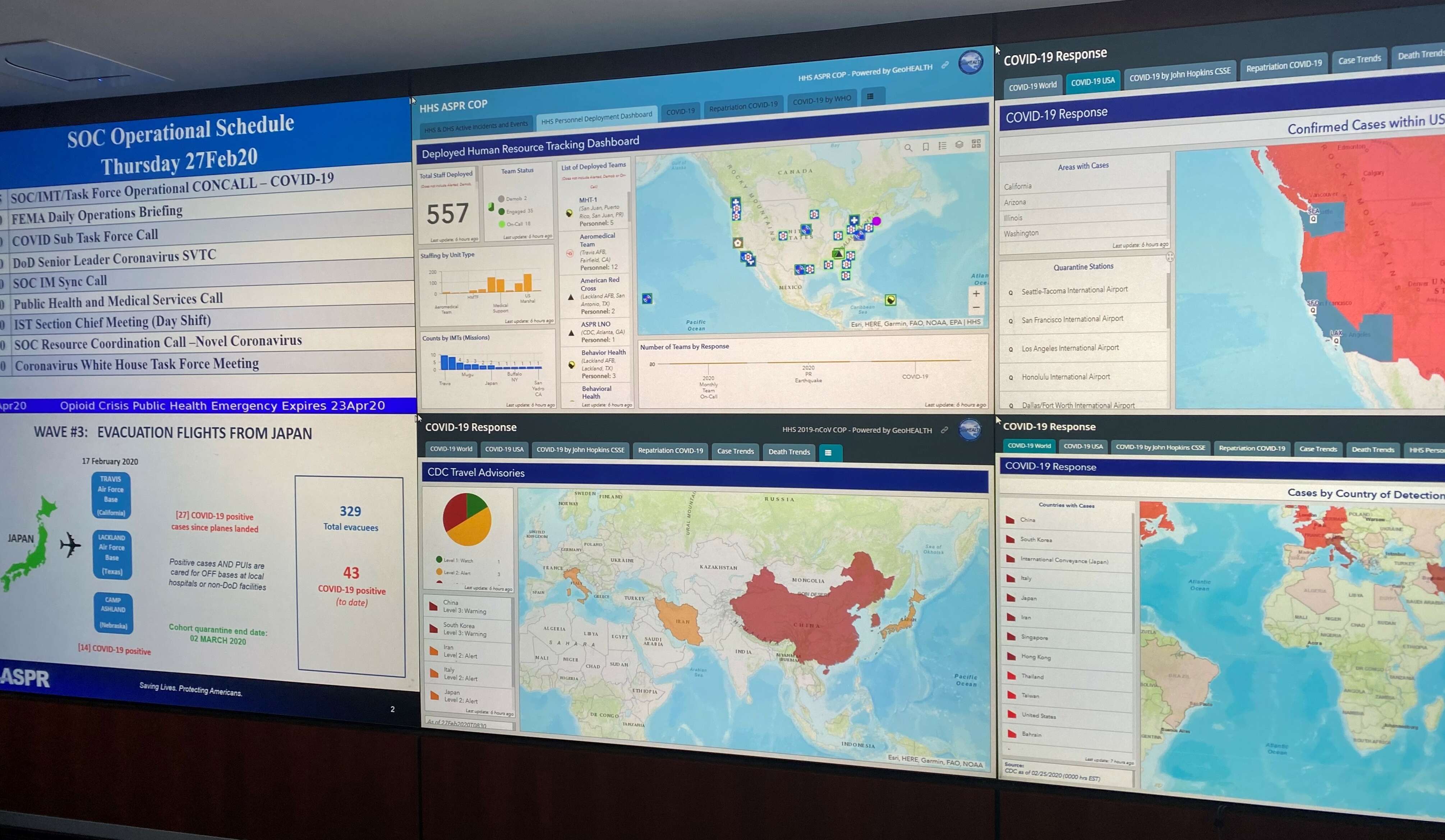Federal response to the coronavirus is in full swing
In today's Federal Newscast, we get a look inside the command center of the interagency task force, responsible for tracking real-time data on the spread of the...
To listen to the Federal Newscast on your phone or mobile device, subscribe in PodcastOne or Apple Podcasts. The best listening experience on desktop can be found using Chrome, Firefox or Safari.

- Health and Human Services’ command center is ramping up to track the spread of and the number of deaths caused by the coronavirus. HHS is leading the interagency task force, which held its first meeting yesterday. The command center provides real-time data on the spread of the disease. It also helps task force leader HHS Secretary Alex Azar decide to suspend travel to certain countries, initiate quarantines and declare a public health emergency.
- Veterans Affairs says it has what it needs to handle the spread of Coronavirus, at least for now. VA is a part of the task force monitoring the spread of the virus in the U.S. VA Secretary Robert Wilkie says the department been in touch with its healthcare workforce about the Coronavirus. But no specific message to veterans about how they should prepare. VA says it’s also checking its medical supply chain ahead of a possible nationwide pandemic.
- Fearing a retirement tsunami, the Centers for Disease Control and Prevention has launched a task force focused on recruiting the people and skills it needs to meet its mission through 2030. Part of that work includes training to give prospective managers the skills they need to supervise others. For mid-level employees uncomfortable with management roles, the agency is also looking at ways to keep them on through technical positions. (Federal News Network)
- OPM has told agencies how best to hire cybersecurity workers. Agencies will continue to face a shortage of cybersecurity workers for the foreseeable future. So the Office of Personnel Management is offering some ideas for how to deal with that talent shortfall aptitude assessments for current workers and new hires. A new memo outlines existing efforts among civilian and defense agencies that focus on cognitive ability tests, knowledge tests, personality assessments and interest inventories. OPM surveyed agencies and found a majority do not use aptitude tests today. The memo fulfills a key milestone under the May 2019 cybersecurity workforce executive order. (Federal News Network)
- The Equal Employment Opportunity Commission is facing staff shortages and that is raising concerns with two Senate Democrats. The number of EEOC employees is down seven percent in 2020. Senate Health, Education, Pension and Labor Committee Ranking Member Patty Murray (D-Wash.) and Senator Elizabeth Warren (D-Mass.) say they want an explanation. Congress authorized more funding for EEOC to hire more employees this year. EEOC’s 2021 budget proposes another 10% workforce cut. Murray and Warren say those cuts would lead to the lowest staffing levels in 40 years.
- A bipartisan group of senators mount a strong defense of collective bargaining at the Defense Department. Senators say they have concerns with a recent memo allowing Defense Secretary Mark Esper to exclude DOD civilians from collective bargaining. They say while DoD does need flexibility to respond to national security concerns, collective bargaining is compatible with those interests. Senator Susan Collins (R-Maine) is part of the group urging President Trump to reconsider his decision.
- The Coast Guard doesn’t have a very good picture of what its employees need to meet their mission. A report from the Government Accountability Office finds the service only has current workforce assessments for four percent of its unit types. GAO says that’s a problem as the Coast Guard is trying to modernize its force. The report suggests updating the Coast Guard plan with timeframes and milestones for completing workforce assessments. It also says the service should find out what resources it will need to complete its goal.
- A Pentagon-funded study finds broad support for transgender people serving in the military. The report says support for transgender service cuts across all branches of the military and ranks. The report recommends lifting the ban President Trump placed on transgender service in 2017. That was after the Obama administration allowed transgender people to openly service in the military.
- New data appears to show DoD health care beneficiaries are having a harder time finding private-sector medical care. An analysis of DoD survey data by the Government Accountability Office says 32% of beneficiaries who use TRICARE Select had trouble finding a provider who would accept the health plan in 2019. That’s up from 27% the year before. People looking for specialty care had more trouble too: 24% said they had problems, compared to 18 percent in 2018. GAO says it’s hard to identify a single cause, because the TRICARE system has been going through a wide variety of changes over the past two years.
- VA has a new timeline to roll out initial electronic health record capabilities. The plan now is to deploy the EHR at its first site in July. A few extra months may give the department more time to ready new capabilities that weren’t initially part of the first deployment. Congress offered mixed feedback on VA’s timeline and budget the department says it needs to get the work done. VA says it needs one billion dollars more this year compared to 2020. Much of the budget increase will support infrastructure upgrades VA says are necessary to support a commercial product. (Federal News Network)
- The government’s health care payment agency launched a modeling program for more efficient emergency services. The Centers for Medicare and Medicaid Service selects 205 organizations to join a five-year payment experiment. It’s designed to get people needing emergency services the most rational ones. The Emergency Triage, Treat and Transport model, or ET3, seeks in part to avoid sending everyone to an emergency room automatically. It incentivizes providers to take people to less acute care facilities, or even treat them on scene. The test occurs 36 states and D.C.
- Following a recent spike in sexual assault and sexual harassment allegations, the National Oceanic and Atmospheric Administration has rolled out mandatory training. NOAA launched the training earlier this month, and so far 40% of its 12,000 employees have completed it. Acting NOAA director Neil Jacobs said the agency also expects to hire more staff to investigate assault and harassment claims. NOAA reported 22 assault allegations in 2018, and another two cases in 2019. (Federal News Network)
- There’s a new champion for taxpayer services. The Treasury Department and IRS have named former KPMG executive Erin Collins as the next permanent National Taxpayer Advocate. SHe replaces Nina Olson who retired last July. Prior to her work in the private sector, Collins spent 15 years as an attorney in the IRS’s Office of Chief Counsel. The National Taxpayer Advocate gives annual updates to Congress on the IRS’s level of service to taxpayers. (Department of the Treasury)
Copyright © 2025 Federal News Network. All rights reserved. This website is not intended for users located within the European Economic Area.
Eric White
Eric White is news anchor and Federal Drive producer at Federal News Network.
Follow @FEDERALNEWSCAST
Related Stories
Related Topics
Alex Azar
All News
Centers for Disease Control and Prevention
Centers for Medicare and Medicaid Services
Covid-19
Department of Health and Human Services
electronic health records
Equal Employment Opportunity Commission
Federal Drive
Federal Newscast
Government Accountability Office
IRS
Management
Mike Pence
National & World Headlines
National Oceanic and Atmospheric Administration
Neil Jacobs
Treasury Department
Workforce
Workforce Rights/Governance




